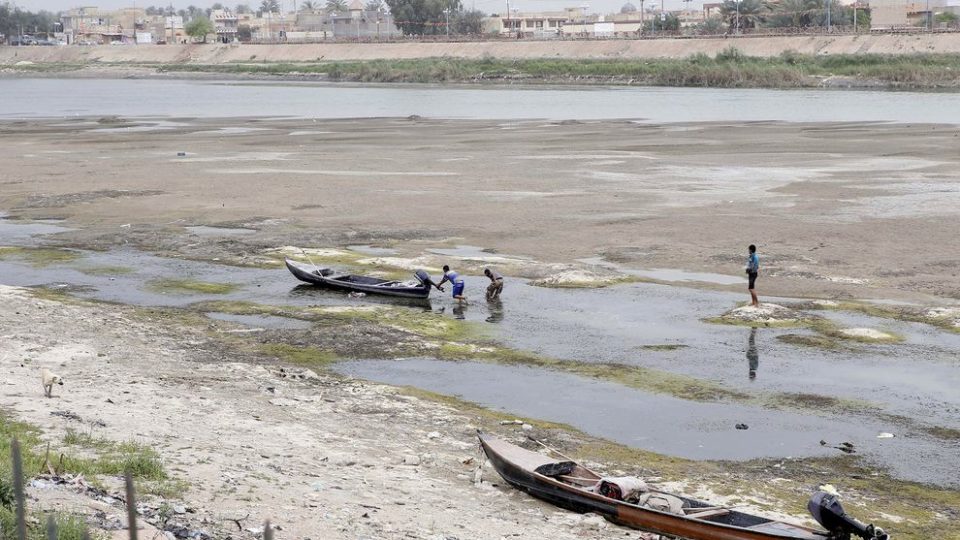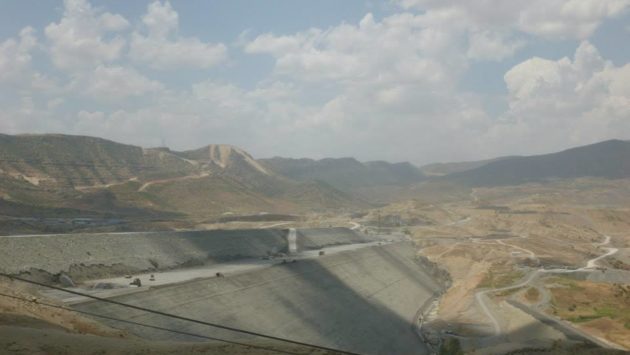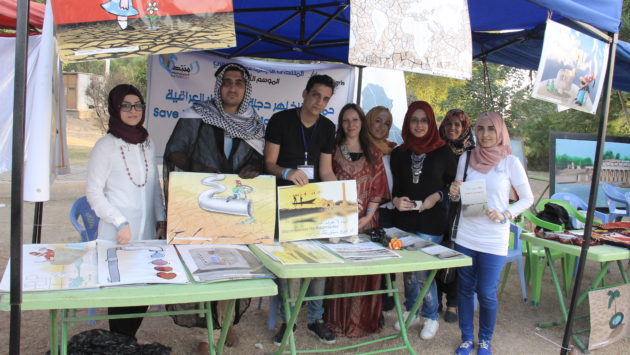Amid Terror Attacks, Iraq Faces Water Crisis
National Geographic – USA
Islamic State’s assault on dams and water systems threatens Iraq’s supply, which was already squeezed by dams in Turkey and Iran.
TELSKUF, Iraq—Viewed from afar, the two-mile-long Mosul Dam is an impressive sight on the flat, sunbaked northern plains.
Move closer, though, and its appearance has a menacing air. The bullet-riddled causeway and abandoned guard posts tell of the dam’s seizure by Islamic State terrorists in early August, and the bomb craters and flattened armored vehicles are evidence of its recapture by Kurdish fighters 12 days later. (Related: “Refugee Flood Heightens Long-Standing Tensions Between Turks and Kurds.”)
The sorry state of Iraq’s biggest dam, about 31 miles (50 kilometers) northwest of Mosul city on the Tigris River, shows how water has become another weapon in the terror group’s arsenal. But its steadily retreating reservoir tells another story, one of how Iraq’s water shortage is growing more urgent by the day.
Built in the early 1980s to supply water, irrigate fields, control floods, and generate electricity, the dam offers an apt metaphor for the war-torn country’s shaky foundation. Its dry spillways are plastered with cement to fill cracks, while the permeable gypsum base has required injections of grout to prevent its collapse since it opened.
Iraq was grappling with water woes long before the Islamic State jihadist group surged through its northwestern provinces and routed much of its army over the summer. But the sudden loss of prime agricultural land and the swift appropriation of scarce water resources have intensified the crisis.
This army of extremist Iraqis and foreign fighters, which now rules considerable territory in Syria and Iraq, has demonstrated a willingness to use water to defeat its foes. Iraqis in endangered areas whose livelihood depends on a reliable supply are panicked.
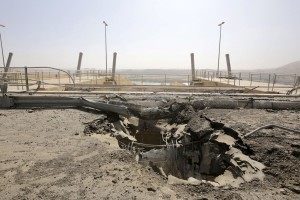
More Precious Than Gold
Ahmed Jemili, whose melon and mango farm in Kirkuk governorate stands about 7 miles (11 kilometers) from the front line, feels this fear keenly. Years of drought and cheap food imports have driven most neighboring farms out of business, and the grizzled Kurd’s small landholding now lies isolated amid distant oil wells and a hastily constructed roadside encampment for refugees.
“For us, water is more precious than gold, and Daesh are just hoarding it,” Jemili said, using an Arabic acronym for the Islamic State of Iraq and Syria, as the group initially branded itself.
“Going to them for water isn’t an option,” he added, with a pained smile. “That would be like doing a deal with the devil.” Last year, an irregular water supply damaged his fruit crop, and he fears another ruined harvest this year if Islamic State commanders divert irrigation channels away from his property.
Until recently, the Islamic State controlled about two-fifths of Iraq’s wheat-producing fields, according to the United Nations. Its defeat at the Mosul Dam has deprived the group of its most prized water asset. But it has retained its hold on the Fallujah Dam, which it hijacked in April, enabling the group to flood government-held farmland near Baghdad and displace up to 40,000 inhabitants.
The Islamic State also controls much of Baqubah’s water infrastructure in the country’s east, putting pressure on the Shiite militia defending the town. In Al Anbar Province, the jihadists have besieged the Haditha Dam for several months. They have continued their assault despite heavy American bombardments in recent weeks.
Analysts familiar with the militants’ tactics say their drive to seize dams is part of a strategy to take over critical government functions to cement their declared caliphate in Syria and Iraq, modeled on the caliphs who ruled the region after Muhammad’s death in A.D. 632.
“Water facilities, like grain silos, are important for the Islamic State’s presentation of itself as an actual state and not a mere group dealing with locals,” said Aymenn al-Tamimi, an authority on Iraqi jihadists at the Philadelphia-based Middle East Forum.
Underscoring its long-term vision, the Islamic State has even assigned experts within its ranks to administer its water riches. A Sudanese engineer is said to preside over the Fallujah Dam, while at the Mosul Dam, the terrorist in control of nearby Tal Afar who is a trained hydrologist took command and allegedly beat workers who refused to reduce electricity flow to Mosul city.
Iraqi Politicians, Distracted by Violence, Fail to Protect Water Flow
The chaos sparked by the Islamic State’s territorial gains has worsened the country’s water crisis, but Iraq’s inaction in the face of other threats is perhaps a greater problem.
For more than a decade, politicians in Baghdad have done little as Turkey and Iran pursued accelerated dam-building programs upstream on the Tigris and Euphrates rivers and their tributaries. The nearly unbroken years of violence after the U.S.-led invasion in 2003 and the political stalemate stemming from antagonism between the nation’s Shiite and Sunni leaders have weakened its institutions and minimized its leverage over its regional rivals.
In Iraq, which receives little rainfall beyond its Kurdish mountains and is almost entirely reliant on the two rivers for its water, this is a potentially catastrophic situation. The oil industry, which is responsible for 95 percent of Iraq’s revenues, needs about 1.8 billion cubic meters of water a year for extraction purposes.
“We’re facing a very critical period,” said Hamza Hasan Shareef, an adviser to the Iraqi National Security Council and member of the High National Water Committee, which is chaired by the new prime minister. “There are many reasons for this, but it’s mostly because of neglect and the aggressive policies of our neighbors.”
Reliable statistics on how much the flows of the Tigris and Euphrates have been cut are hard to come by: The stakes are so high that all sides come armed with their own facts. Among Iraqis, however, there’s a consensus that water flow has fallen by at least a third, with some experts suggesting it has declined by up to 60 percent.
There’s evidence to bolster Baghdad’s claims. The Tigris and Euphrates lost 144 cubic kilometers from their combined basins between 2003 and 2009, or roughly the amount of water held in the Dead Sea, according to NASA researchers. With 40 percent of the Euphrates basin and 54 percent of the Tigris basin in Iraq, the mostly arid country appears to have borne the brunt of this reduced flow.
The volume of the Euphrates is expected to drop by at least half by 2025, according to another study conducted by the UN. Already the city of Nasiriyah on the Euphrates south of Baghdad takes water from the Tigris to make up the shortfall.
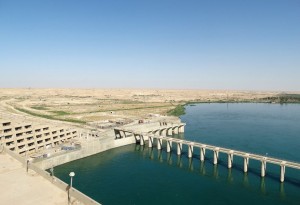
Dams in Turkey and Iran Diminish Tigris and Euphrates
Iran has been the closest ally of recent Iraqi governments, and so its continued dam construction is seen as a betrayal by many politicians. It has blocked or diverted 22 of the 42 waterways that pass from its territory into Iraq, according to officials in Baghdad. Residents of Khanaqin, on the Iranian border, have taken to using the dry riverbed of the nearly obstructed Alwand tributary as a crosstown highway in the summer months.
But it’s Turkey’s dam-building projects that are really infuriating Iraqis. Ankara has 635 big dams, according to International Rivers, which works to protect waterways, and most of the largest are within the Tigris and Euphrates basins. The reservoir of the almost completed Ilısu Dam on the Tigris is expected to hold at least another ten billion cubic meters when it’s filled, but Turkey still plans to build more to meet its burgeoning electricity requirements. (See “New Dam in Turkey Threatens to Flood Ancient City and Archaeological Sites.”)
Iraqi officials insist Turkey has violated the 1946 water treaty, which obliges upstream Turkey to inform downstream Iraq and Syria of any consequential water moves, but repeated protests have been ignored. The absence of any senior Turkish officials at a transboundary water conference in Istanbul last month suggests the stronger party is not yet willing to talk.
Azzam Alwash, head of Nature Iraq and the man who spearheaded the restoration of the country’s marshlands in the south, maintains the Turks are intent on turning water into a commodity. “They’re trying to sell water for oil. They see it as something bought and sold,” he said. “They say, ‘We don’t tell you what to do with your oil, so why should you tell us what to do with our water?'”
Alwash believes it’s imperative for Iraq to cut a deal with its neighbors over water use. “My concern is that if we don’t reach some kind of water treaty, agriculture is going to die in the land in which it was born,” he said. “As things stand, it’s a when, not an if.”
The Iranian foreign and agricultural ministries did not respond to requests for comment, while the Turkish foreign ministry, which is responsible for fielding queries about the country’s dam program, declined to answer questions.
An Independent Iraqi Kurdistan Could Heighten Water Crisis
Iraq’s water issues could become even more muddled if the nation’s Kurdish minority decides to break away to create an independent state. The new country would likely assume control over much of Iraq’s portion of the Tigris basin, while also inheriting the only reliably rain-fed areas, the Zagros Mountains that rise in the northeastern region. (See “The Kurds May Seize the Moment to Break Free of Iraq.”)
Kurdish officials, however, appear to be as unfocused on river issues as their Iraqi counterparts. Only one of the 18 agricultural ministers for Kurdistan since 1991 came from a science or water-related background; the current minister is a cleric. “The only thing ministers care about water is the water they put into their whiskey,” said Talib Murad Elam, an adviser to the prime minister of the semi-autonomous Kurdish Regional Government.
But the Kurdish government has proposed its own dam-building program, and its continued control of the Mosul Dam suggests its leaders are wising up to water’s usefulness as a pawn in future negotiations with Baghdad.
Farmers Struggle With Polluted Water in Low Rivers
Meanwhile, ordinary Iraqis and Kurds are suffering the consequences of their homeland’s bleak environmental outlook. (Related: “Will Shrinking Rivers Force Kurdistan’s Nomads to Abandon Their Lifestyle?”)
Kawa Ali Mohammed Amin has farmed near the Tancero River outside the Kurdish city of As Sulaymaniyah for more than two decades, but declining water quality worsened by reduced river flow means he can no longer grow rice or okra. He depends now on tall grass that he cultivates for animal feed.
“There’s no way anyone can sell their stuff in the markets. The water is too polluted,” he said. “I’m continuing, but for every me there’s a hundred farmers who just give up.”
Farmers bear some responsibility for this poor water quality and the shrinking volume of usable water. They adhere to ancient Sumerian flood irrigation practices, which lift salt to the top of the soil and wash it back into waterways. At the same time, farmers have bored many of Kurdistan’s more than 14,500 illegal wells, which has lowered the water table and doubled the depth to which new wells must be dug, putting additional pressure on the rivers as a water source.
Nabil Musa, a local environmentalist from the Waterkeeper Alliance, is despondent about the sewage and lack of water in rivers and streams.
While staring at a filthy, pitifully low Tigris tributary, he said, “We shouldn’t call this a river. It’s not swimmable, it’s not drinkable, it’s not fishable.”
Article by Peter Schwarzstein
Featured Image by: Mohammed Sawaf, Getty Images

